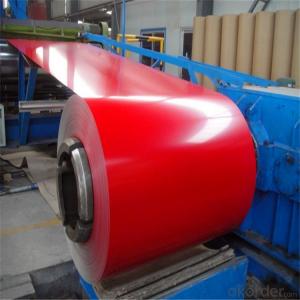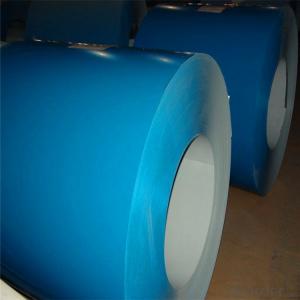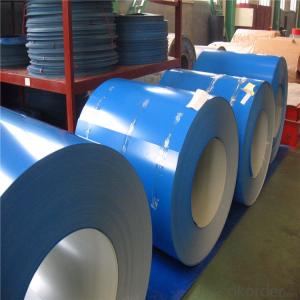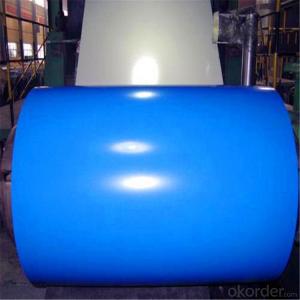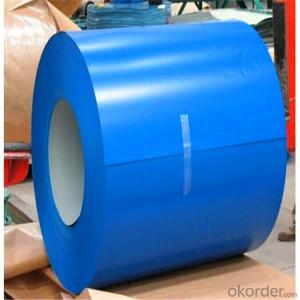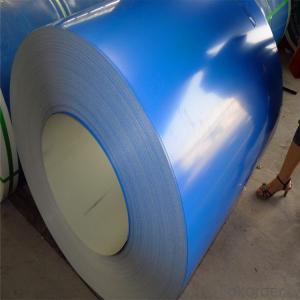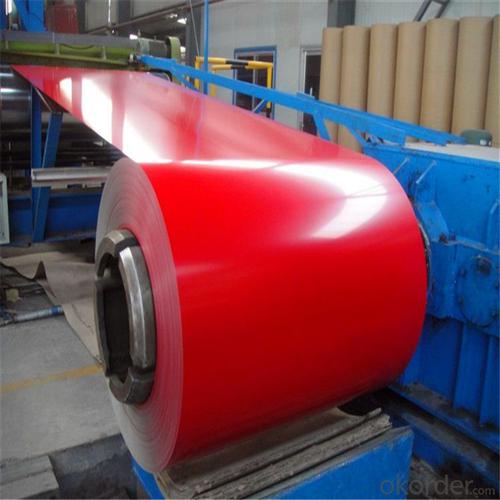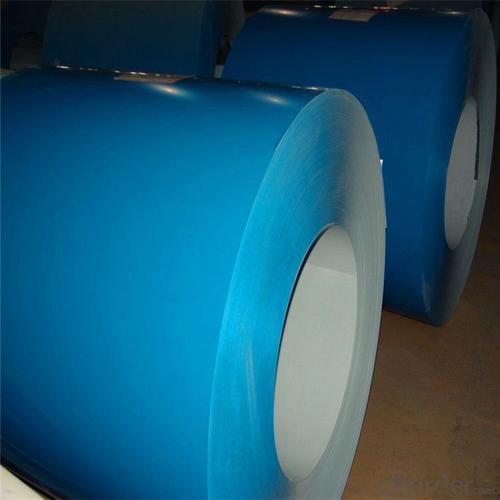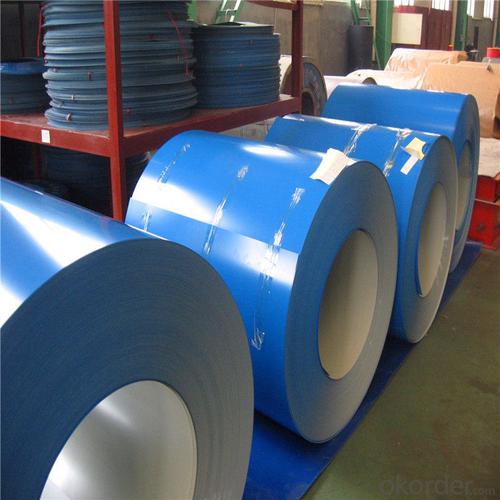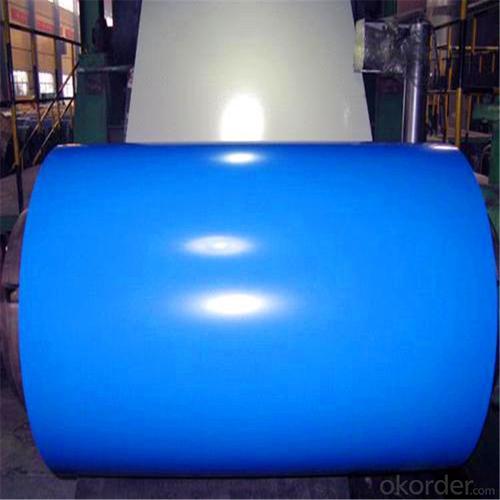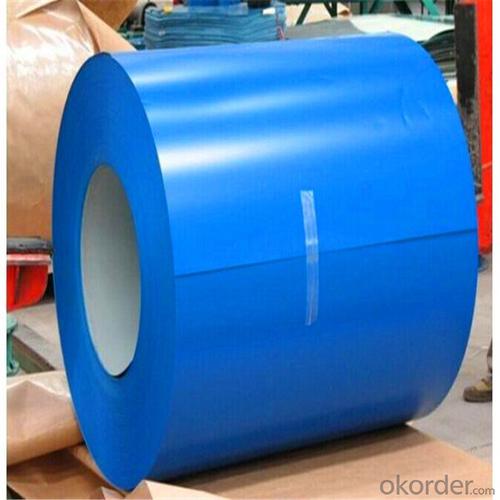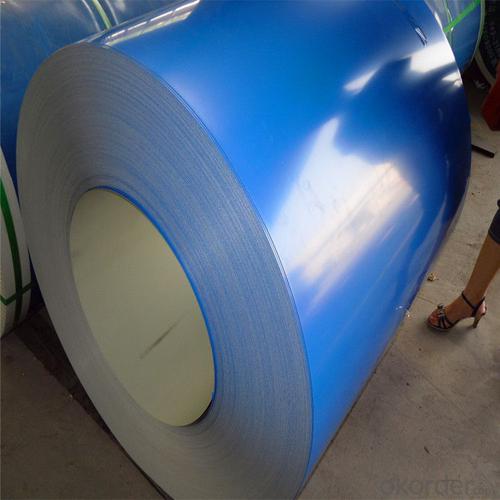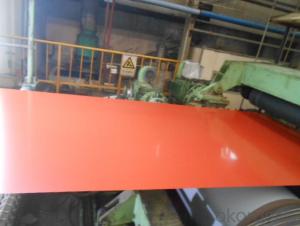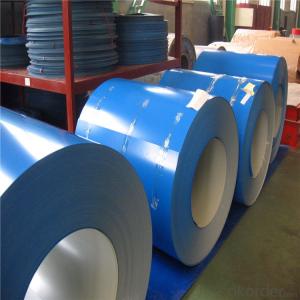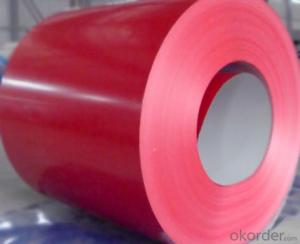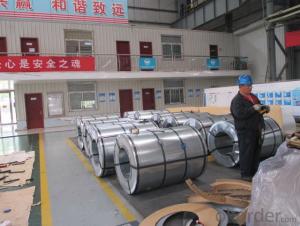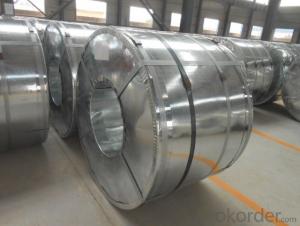CGCC PPGI Coils from CJC Steel Factory Mills
- Loading Port:
- Tianjin
- Payment Terms:
- TT or LC
- Min Order Qty:
- 25 m.t.
- Supply Capability:
- 5000 m.t./month
OKorder Service Pledge
OKorder Financial Service
You Might Also Like
Specification
CGCC PPGI Coils from CJC Steel Factory
Description of CGCC PPGI Coils from CJC Steel Factory
Product | PPGI/PPGL |
Capacity | 5,000 tons/month |
Base material | Hot dipped galvanized steel |
Thickness | 0.2-2.0mm |
Width | 600-1250mm(according to your need) |
Coil Weight | 3-6tons |
Quality | SGCC, DX51D |
Color | RAL No. or customers samples’ color |
Zinc-coating | 30g/m2-180g/m2 |
Coil ID | 508mm/610mm |
Technique | Cold rolled—hot dipped galvanized—color coated |
Painting | Top painting:15~25μm |
Back painting: 6~10μm | |
Tolerance | Thickness: +/-0.02mm |
Width:+/-2mm | |
Shipment time | within 15-45 workdays |
Payment | T/T, L/C at sight |
Packing | Standard export packing |
The special order can be negotiated. | |
Application of CGCC PPGI Coils from CJC Steel Factory
APPLICATION OF OUR PREPAINTED STEEL | ||||||||||
Construction | Outside | Workshop,agricultural warehouse,residential precast unit | ||||||||
corrugated roof,roller shutter door,rainwater drainage pipe,retailer booth | ||||||||||
Inside | Door,doorcase,light steel roof stucture,folding screen,elevator,stairway,ven gutter,Construction Wall | |||||||||
Electrical applicance | Refrigerator,washer,switch cabnet,instrument cabinet,air conditioning,micro-wave owen,bread maker | |||||||||
Fuiniture | Central heating slice,lampshade,chifforobe,desk,bed,locker,bookself | |||||||||
Carrying trade | Exterior decoration of auto and train,clapboard,container,isolation lairage,isolation board | |||||||||
Qthers | Writing panel,garbagecan,billboard,timekeeper,typewriter,instrument panel,weight sensor,photographic equipment | |||||||||
Products Show of CGCC PPGI Coils from CJC Steel Factory

Product Advantages
1.With nearly 20 years experience in prepainted steel, accommodate different marketdemands. | ||||||||||||||
2.'Quality first, service first' is our business aim; 'The good faith get respect,cast quality market' is our Business philosophy . | ||||||||||||||
3.Having two series producttion line,with the abbual production capacity of 240000 tons. | ||||||||||||||
4.Exceed International ISO9001:2008&ISO14001:2004 quality and environmental standards | ||||||||||||||
5.Meet with ROHS standard |
Company Information
CNBM International Corporation is the most important trading platform of CNBM group.
Whith its advantages, CNBM International are mainly concentrate on Cement, Glass, Iron and Steel, Ceramics industries and devotes herself for supplying high qulity series of refractories as well as technical consultancies and logistics solutions.


F A Q
1, Your advantages?
professional products inquiry, products knowledge train (for agents), smooth goods delivery, excellent customer solution proposale
2, Test & Certificate?
SGS test is available, customer inspection before shipping is welcome, third party inspection is no problem
3, Factory or Trading Company?
CNBM is a trading company but we have so many protocol factories and CNBM works as a trading department of these factories. Also CNBM is the holding company of many factories.
4, Payment Terms?
30% TT as deposit and 70% before delivery.
Irrevocable L/C at sight.
5, Trading Terms?
EXW, FOB, CIF, FFR, CNF
6, After-sale Service?
CNBM provides the services and support you need for every step of our cooperation. We're the business partner you can trust.
For any problem, please kindly contact us at any your convenient time.
We'll reply you in our first priority within 24 hours.
- Q: What are the applications of special steel in the aerospace sector?
- Due to its exceptional properties and capabilities, special steel finds numerous applications in the aerospace sector. Firstly, it is utilized in the manufacturing of aircraft engines. Special steel's high strength and temperature resistance make it an ideal choice for components such as turbine blades and discs, which experience extreme heat and stress during operation. Moreover, special steel provides excellent corrosion resistance, ensuring the durability and reliability of vital engine parts. Another important application of special steel in the aerospace sector involves constructing aircraft structures. Special steel alloys are employed to fabricate landing gear, wing components, and other structural elements. The high strength-to-weight ratio of special steel enables the production of lightweight yet sturdy structures, contributing to fuel efficiency and overall performance. Special steel is also essential in producing aerospace fasteners, including bolts, nuts, and screws that secure various aircraft components together. Special steel's exceptional mechanical properties, fatigue resistance, and vibration resistance make it an ideal material for fasteners, ensuring the integrity and safety of aircraft assemblies. Furthermore, special steel is utilized in aerospace tooling and equipment. Tools used in the manufacturing process, such as cutting tools and molds, are often made from special steel. Its high hardness and wear resistance enable efficient and precise machining of aerospace components. Additionally, special steel is employed in the production of specialized equipment, such as test rigs, calibration devices, and ground support equipment, which are crucial for aerospace operations and maintenance. In conclusion, special steel plays a crucial role in the aerospace sector, contributing to the overall safety, performance, and reliability of aerospace systems. Its use in aircraft engines, structures, fasteners, and tooling is indispensable for the demanding and critical applications within the aerospace industry, thanks to its unique properties.
- Q: How does special steel compare to other materials, such as aluminum or titanium?
- Special steel is known for its exceptional strength, durability, and versatility, making it a preferred choice in various industries. When compared to other materials like aluminum or titanium, special steel often offers superior mechanical properties, including higher tensile strength, hardness, and wear resistance. It also generally has better thermal conductivity and is more resistant to corrosion. However, aluminum and titanium have their own advantages, such as being lighter in weight and having better overall corrosion resistance. Ultimately, the choice between special steel, aluminum, or titanium depends on the specific application, considering factors like strength requirements, weight limitations, cost-effectiveness, and environmental conditions.
- Q: Is special steel suitable for manufacturing cutting tools?
- Yes, special steel is suitable for manufacturing cutting tools. Special steel, also known as tool steel, is specifically designed to have high hardness, wear resistance, and toughness, making it ideal for cutting tool applications. It can retain sharpness for an extended period, withstand high temperatures, and provide excellent cutting performance, making it a preferred choice for manufacturing cutting tools such as drills, saw blades, and milling cutters.
- Q: How does special steel perform in automotive applications?
- Special steel performs exceptionally well in automotive applications due to its unique properties and characteristics. It offers superior strength, durability, and resistance to wear and corrosion, making it highly suitable for critical components such as engine parts, chassis, and suspension systems. Special steel also enables the production of lightweight designs, enhancing fuel efficiency and reducing emissions. Additionally, its high heat resistance and thermal conductivity contribute to improved performance and safety in extreme conditions. Overall, the use of special steel in automotive applications ensures enhanced reliability, performance, and longevity of vehicles.
- Q: Can special steel be used in the food packaging industry?
- Yes, special steel can be used in the food packaging industry. Special steel alloys, such as stainless steel, are commonly used in food packaging due to their corrosion resistance, durability, and ability to maintain product integrity. These properties make special steel suitable for applications where hygiene, safety, and longevity are essential, making it an ideal choice for various food packaging materials and equipment.
- Q: Can special steel be used in the beverage manufacturing industry?
- Yes, special steel can be used in the beverage manufacturing industry. Special steel, such as stainless steel, is commonly used in the beverage industry due to its corrosion resistance, hygiene properties, and durability. It is often utilized for the production of tanks, containers, piping, and other equipment involved in the processing, storage, and transportation of beverages.
- Q: What are the limitations of welding special steel?
- There are several limitations associated with welding special steel. Firstly, special steels often have high carbon content or alloying elements, which can lead to increased susceptibility to cracking during the welding process. Additionally, special steels may have unique microstructures, such as high hardness or brittleness, which can pose challenges in achieving proper weld penetration and joint strength. Furthermore, the heat input required for welding special steels can result in distortion or warping of the workpiece, requiring additional post-welding processes to correct. Finally, special steels may require specific pre-welding preparations, such as preheating or special welding consumables, which can increase the complexity and cost of the welding process.
- Q: How is electrical steel used in the manufacturing of transformers?
- Electrical steel, also known as silicon steel, is crucial in the manufacturing of transformers. It is used to construct the core, which is the heart of the transformer. The unique magnetic properties of electrical steel allow it to efficiently conduct and transfer electrical energy. By laminating thin layers of electrical steel together, the core minimizes energy losses through eddy currents and hysteresis. This ensures optimal performance, high efficiency, and reduced heat generation in transformers.
- Q: What are the common challenges in forging special steel?
- Forging special steel poses several common challenges that manufacturers and engineers must address in order to achieve desired outcomes. One of the primary challenges in forging special steel is maintaining precise temperature control throughout the process. Special steels often have specific heat treatment requirements, and any deviation from the recommended temperature range can adversely affect the final properties of the material. Achieving and sustaining the right temperature is crucial to ensure desired mechanical properties like strength, hardness, and toughness. Another challenge in forging special steel is controlling the cooling rate during quenching. Quenching is a critical step in the heat treatment process that helps to achieve the desired hardness and strength in special steels. However, rapid cooling can lead to the formation of undesirable microstructures or even cracking. Therefore, carefully managing the cooling rate is essential to avoid these issues and ensure optimal material properties. Additionally, shaping special steels through forging can be challenging due to their high strength and hardness. These materials are often more difficult to deform compared to regular steels, requiring higher forging pressures and specialized equipment. The resistance to deformation can lead to increased wear on the forging dies, requiring frequent maintenance and replacement. Furthermore, special steels may contain alloying elements that can affect their forgeability. Some alloying elements can promote grain growth, which can reduce the mechanical properties of the material. Finding the right balance of alloying elements and optimizing the forging process parameters is crucial to achieve the desired microstructure and properties in the final product. Lastly, ensuring consistency and repeatability in the forging process can be a challenge. Special steels are often produced in smaller quantities or for specific applications, making it important to maintain process control and quality assurance. Proper documentation, monitoring, and quality control measures need to be implemented to ensure that the forged special steel meets the desired specifications and performance requirements. Overall, forging special steel requires careful attention to temperature control, cooling rate during quenching, shaping difficulties, alloying elements, and maintaining consistency. Addressing these challenges through proper process control and optimization is crucial to obtain high-quality special steel products with the desired mechanical properties and performance characteristics.
- Q: How does special steel contribute to the robotics industry?
- The robotics industry benefits greatly from the use of special steel, which plays a vital role in its advancement. To begin with, special steel alloys possess extraordinary mechanical properties that make them ideal for manufacturing various robotic components. These alloys provide exceptional strength, durability, and resistance to wear and tear. Consequently, robots built with special steel can operate efficiently and reliably even in demanding environments like manufacturing plants or hazardous locations. Furthermore, special steel alloys offer outstanding heat resistance and thermal stability, a crucial characteristic in robotics. As robots often generate significant heat during operations, special steel components can withstand high temperatures without deforming or losing their structural integrity. This capability ensures that robots can perform optimally without the risk of mechanical failures caused by heat-related issues. Additionally, the corrosion resistance of special steel is highly advantageous for the robotics industry. Robots are increasingly being used in diverse applications such as underwater exploration, chemical handling, and outdoor environments. In such cases, exposure to moisture, chemicals, or harsh weather conditions can lead to corrosion and degradation of robot parts. By utilizing special steel alloys, manufacturers can significantly prolong the lifespan of robotic systems, reducing maintenance costs and enhancing overall reliability. Moreover, special steel's magnetic properties are invaluable in the development of magnetic sensors and actuators used in robotics. These sensors enable robots to detect and interact with their surroundings, improving their autonomy and adaptability. On the other hand, magnetic actuators enable precise control and movement in robotic systems. Special steel's magnetic properties contribute to the efficiency, accuracy, and responsiveness of these components, allowing robots to execute complex tasks with precision. In conclusion, special steel plays a vital role in the robotics industry by providing the necessary materials for manufacturing robust, high-performance, and versatile robotic systems. The use of special steel alloys enhances strength, durability, and the ability to withstand extreme conditions, ensuring the reliability, efficiency, and functionality of these machines.
Send your message to us
CGCC PPGI Coils from CJC Steel Factory Mills
- Loading Port:
- Tianjin
- Payment Terms:
- TT or LC
- Min Order Qty:
- 25 m.t.
- Supply Capability:
- 5000 m.t./month
OKorder Service Pledge
OKorder Financial Service
Similar products
Hot products
Hot Searches
Related keywords
